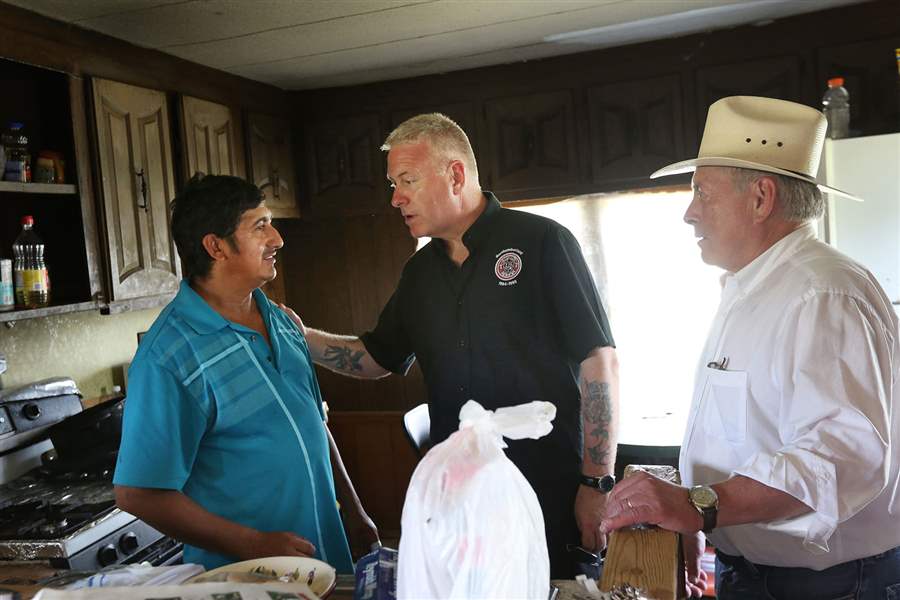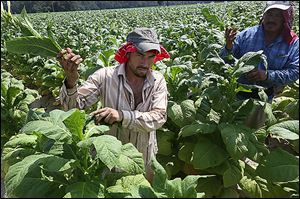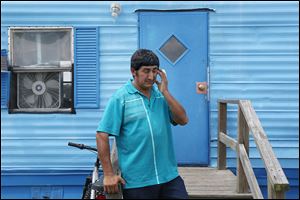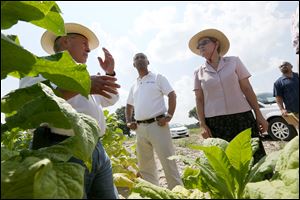
FLOC, Kaptur, British allies see woes of migrant workers in North Carolina
7/27/2014
Santiago Garcia, left, talks with British member of Parliament Ian Lavery, center, as FLOC President Baldemar Velasquez, right, translates.
THE BLADE/KATIE RAUSCH
Buy This Image

Santiago Garcia, left, talks with British member of Parliament Ian Lavery, center, as FLOC President Baldemar Velasquez, right, translates.
DUDLEY, N.C. — It’s hot and cramped inside the bright blue trailer where tobacco farm worker Santiago Garcia lives with four others.
A single box fan whirls in a main room window, barely cooling the small space that holds two cots. In the back, fabric blocks light from the small windows above two more beds.
Signs of hard labor litter the floor: hats to shade the blazing North Carolina sun, work boots, bug spray, and soiled gloves.
Clothes fill an outdoor sink where workers wash and wring them dry. If absorbed into the skin, tobacco-leaf residue can lead to nicotine poisoning and symptoms such as headaches and vomiting.
PHOTO GALLERY: Click here to view slideshow.
A crude hole cut into the siding fits a line connected to a tiny propane tank resting on the grass outside the trailer.
“It’s one of the nicer places,” said Baldemar Velasquez, president and founder of the Toledo-based Farm Labor Organizing Committee.
The trailer was the first stop Saturday of a multiday fact-finding mission to see migrant camps and probe what the union considers human rights abuses that victimize vulnerable tobacco field workers in North Carolina.
The binational delegation accompanying him includes U.S. Rep. Marcy Kaptur (D., Toledo) and Ian Lavery and Jim Sheridan, members of the British Parliament.
A laborer’s life
They toured the trailer where Mr. Garcia lives and asked about his life. He used his Guatemalan land as collateral to pay a smuggler to come here, and the 45-year-old worker recently caught his finger in a mechanical tobacco harvester. Bandaged and unable to work, he’s worried about money — a constant concern, because when he can work, he makes about $7 an hour, less than the $7.25 minimum wage.

Tobacco workers tend the crops in the fields.
A contractor charges Mr. Garcia and his roommates $25 a week in rent and utilities to live in the trailer, located amid about 20 others on a flat, nearly treeless property.
“No hot water — even to wash the clothing that people were wearing. I felt like I was being taken back to the 19th century, and indeed I was,” Miss Kaptur told a town hall-style forum later Saturday.
The injured worker’s experience was echoed during the forum, attended by about 100 farm workers, union organizers, supporters, and AFL-CIO representatives.
Workers told the visiting dignitaries that women commonly face sexual exploitation from supervisors. Laborers lack protective clothing, don’t have access to bathrooms or drinking water in the fields, and are sickened by pesticides.
“It’s horrifying. It’s hot,” said Maria Garcia, 26, who has toiled in area tobacco fields for several years and is not related to Mr. Garcia. “It’s like they don’t even care. We’re human too.”
British pressure
Once back in the United Kingdom, the Labor Party politicians said they will exert pressure on British American Tobacco, which owns the biggest share of tobacco giant Reynolds American Inc., to make changes that improve the lives of migrant workers.

Santiago Garcia, a tobacco worker from Guatemala, pauses as he shares his worry over his inability to work.
“So we have a global task, and it starts here this weekend in North Carolina to make sure tobacco workers get the deal they deserve and share in some of the profits that the tobacco companies are making,” said Mr. Sheridan, earlier in the day.
A cluster of counties in east-central North Carolina are the largest tobacco producers in a state where tobacco is still a top crop.
Here — in the hot, humid heart of Tar Heel tobacco — FLOC set up its field office. Dudley is a tiny community about 60 miles southeast of the state capital, Raleigh.
FLOC’s mission
FLOC came to this southern state for the cucumber crop. A decade ago, it organized farm workers in the supply chain of Mt. Olive Pickle Co., based in nearby Mount Olive, just six miles south of Dudley. The pickle pact copied an agreement FLOC reached in the mid-1980s with Campbell Soup Co., workers, and Toledo-area growers.
About 7,800 laborers who work in crops from cucumbers to tobacco and sweet potatoes are now covered through a collective-bargaining agreement between FLOC and the North Carolina Growers Association. The association provides farmers with workers who have entered the United States legally through an agricultural work-visa program.

An on-the-job accident resulted in the amputation of part of Garcia's left index finger.
The delegation visited tobacco fields owned by Jerry Tyndall of Lenoir County, who uses the association to provide laborers to tend his 112 acres. He pulled up in a pickup as workers made their way through the field and stopped for a water break.
Mr. Tyndall said companies such as Philip Morris USA Inc. are pushing farmers to improve standards and said he develops good relationships with his workers, many of whom return year after year.
“I’m not going to ask them to do anything that I haven’t done,” he said.
But many other field workers don’t have work visas and fear retaliation from growers or contractors if they complain about conditions, Mr. Velasquez has said. This summer, the union launched a campaign to sign up 5,000 North Carolina tobacco workers. A board in the union hall boasts the current tally: 721.
His goal is to force Reynolds to adopt what FLOC contends are much-needed reforms in its supply chain to improve the lives of farm workers. Reynolds, parent company of R.J. Reynolds Tobacco Co., is a major purchaser of North Carolina’s tobacco.

Reynolds’ position
Reynolds officials have repeatedly refused requests from The Blade to comment on farm-labor issues beyond a statement posted online, and spokesman Bryan Hatchell on Friday again declined to discuss the topic or FLOC’s efforts.
The company, based in Winston-Salem, N.C., holds that because it does not employ farm workers or grow tobacco it can’t control how much laborers are paid or their housing conditions. Its position directly conflicts with FLOC’s focus on tobacco manufacturers. The union argues that Reynolds and other tobacco companies have greater resources than farmers to instigate changes, such as ensuring freedom of association for farm workers.
Reynolds points to its efforts to assess farm conditions, require growers to receive training about green tobacco sickness and heat stress — two big dangers — and help growers “meet or exceed regulatory requirements.”
“We have taken constructive steps to help these farmers provide their workers with safe working conditions and humane living conditions. These efforts are ongoing, and they involve both our own initiatives and cooperative efforts with others,” according to a statement on Reynolds’ Web site.

FLOC President Baldemar Velasquez, left, discusses working conditions with AFL-CIO Executive Vice President Tefere Gebre, center, and U.S Rep. Marcy Kaptur.
Camp conditions
Miss Kaptur described camp conditions as “squalorlike” and called for the United States to address labor trafficking.
“It is hurting our basic fundamental value of liberty,” she told the town hall gathering.
Union supporters are making modest demands, Mr. Lavery said.
“What we want is decent housing; decent safety and health; decent wages, terms, and conditions. And these are basic human rights. We want to be treated as equals,” he said.
The fact-finding trip continues today with visits to more labor camps and a forum in Raleigh at Pullen Memorial Baptist Church, where the delegation will hear from church leaders and other farm-worker advocates.
Contact Vanessa McCray at: vmccray@theblade.com or 419-724-6065, or on Twitter @vanmccray.